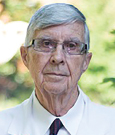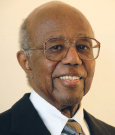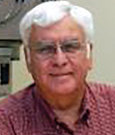The American Society for Radiation Oncology (ASTRO) has chosen three radiation oncology physicians and researchers to receive the 2015 ASTRO Gold Medal: Carl R. Bogardus, Jr, MD, FASTRO; Carl M. Mansfield, MD, ScD (Hon), FASTRO; and James B. Mitchell, PhD, FASTRO. Drs. Bogardus, Mansfield, and Mitchell will be recognized with the ASTRO Gold Medal during ASTRO’s 57th Annual Meeting, October 18–21, 2015, at the Henry B. González Convention Center in San Antonio, Texas.
The ASTRO Gold Medal is the honor received by members of ASTRO who have achieved outstanding lifetime contributions in the field of radiation oncology, including in research, clinical care, and teaching, as well as through their dedicated service to ASTRO. First awarded in 1977, the ASTRO Gold Medal has been conferred on 78 of ASTRO’s more than 10,000 members, including the three 2015 awardees.
“It is with great appreciation, admiration, and respect that I congratulate my esteemed colleagues, Drs. Bogardus, Mansfield, and Mitchell,” said ASTRO Chair Bruce G. Haffty, MD, FASTRO. “The impact of their work, collectively and individually, provided the firm foundation for radiation oncology’s integral role in the triad of cancer care. The clinical, biologic, and technologic advances we have achieved as a specialty are due in large part to their impressive and important work.”
Carl R. Bogardus, Jr, MD, FASTRO
Dr. Bogardus is Professor, Clinical Director, and Vice Chairman of the Department of Radiation Oncology at the University of Oklahoma Health Sciences Center in Oklahoma City. He is the only person to have served as both President of ASTRO (1989–1990) and the American College of Radiology (1991–1992). Dr. Bogardus has been an instrumental member of numerous ASTRO committees including the Medical Economics Committee and the Committee on Practice Regulation, as a representative on the CPT Advisory Panel, and he served as Treasurer of the Board of Directors prior to his term as President.
His concepts of care and reimbursement, as detailed in his “User’s Guide for Radiation Oncology,” provided the stepping stones that have created the documentation for many of the technical and scientific advances in the field. Dr. Bogardus was recognized as a Fellow of ASTRO in 2006.
Dr. Bogardus’ commitment to radiation oncology’s process of care includes his efforts as the inventor and senior developer of the ONCOCHART electronic medical record (EMR), a first-of-its-kind, full-featured EMR that documents the cognitive and procedural work for appropriate billing of radiation oncology services and also provides decision support and interoperability with other electronic systems.
He joined the University of Oklahoma Health Sciences Center as Assistant Professor of Radiology and Associate Radiation Therapist in 1964. During his more than 50-year tenure at the University, Dr. Bogardus served in numerous roles. Most notably, he was the founding Director of the University’s originally 3-year Resident Training Program in the Department of Radiological Sciences from 1964 to 1995 and again as the Director from 2007 to 2008 when the program grew to become a 4-year residency program within the newly created Department of Radiation Oncology.
Dr. Bogardus earned his medical degree at the University of Louisville School of Medicine. He served his residency in therapeutic radiology at Penrose Cancer Hospital in Colorado Springs, Colorado. His fellowship in radiation therapy and radiation physics was at the Mallinckrodt Institute of Radiology at Washington University School of Medicine, St. Louis.
Carl M. Mansfield, MD, ScD (Hon), FASTRO
Dr. Mansfield retired from a nearly 50-year medical career in 2002. He was Associate Director of the Greenebaum Cancer Center and Chairman of the Department of Radiation Oncology at the University of Maryland. His career included the positions of Professor and Chairman of the Department of Radiation Oncology at the University of Kansas Medical Center; Professor and Chairman of the Department of Radiation Oncology and Nuclear Medicine at Thomas Jefferson University Hospital; and Associate Director of the Division of Cancer Treatment, Diagnosis and Treatment Centers Radiation Research Program at the National Cancer Institute (NCI).
Dr. Mansfield is considered a pioneer in intraoperative radiation therapy for early-stage breast cancer. He produced a seminal 1983 report comparing perioperative and intraoperative (iridium-192) breast implants, which laid the groundwork for much of the continuing research in this field today. His work also led to advances in the conservative management of breast cancer through breast irradiation and local brachytherapy; this method of treatment excised the tumor without removing the entire breast. He has also written a book on breast cancer and was editor of two radiation therapy textbooks.
Dr. Mansfield earned his medical degree from Howard University and an Honorary Doctor of Science degree from Lincoln University. In addition to his postdoctoral fellowship at Middlesex Hospital, he was the Chernicoff Fellow in Pediatric Radiation Therapy at Jefferson Medical College Hospital from 1964 to 1966 and served another year at the Meyerstein Institute of Radiotherapy at Middlesex Hospital Medical School from 1972 to 1973.
James B. Mitchell, PhD, FASTRO
Dr. Mitchell is currently Branch Chief of the Radiation Biology Branch of the NCI at the National Institutes of Health (NIH). Dr. Mitchell was recognized as a Fellow of ASTRO in 2009 and served as the Vice-Chair of the Radiation Biology Committee and on ASTRO’s Scientific Committee, among numerous other roles. His more than 40-year career as a preeminent radiobiologist includes work in the Department of Radiation Oncology at Vanderbilt University Hospital, the Department of Radiology and Radiation Biology at Colorado State University, and the NCI at NIH.
Dr. Mitchell’s achievements include his role as a teacher and leader in the field of tumor biology, and the development of novel radiation protectors and sensitizers. He also assisted in the development of photodynamic therapy for clinical cancer treatment at the NCI. Together with his colleague Murali Krishna, PhD, he has worked toward the development and testing of novel in vivo imaging platforms for the noninvasive determination of tissue hypoxia and metabolism.
Dr. Mitchell earned his PhD in cellular radiation biology from Colorado State University. ■




